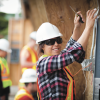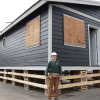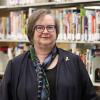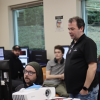
The new Gerontology Diploma offered by VIU will prepare professionals working in a number of different fields to work holistically with older adults.
April 19, 2016 - 9:45am
Interdisciplinary diploma will prepare practitioners to work holistically with older adults
Vancouver Island’s population is aging and the percentage of people aged 75 and older is expected to increase exponentially over the next two decades compared to other age groups. To serve this aging demographic, the Island needs professionals who understand the diverse and evolving needs of older adults, which is just what a new program offered by Vancouver Island University (VIU) will provide.
The Graduate Diploma in Gerontology, set to begin this fall, takes an interdisciplinary approach to understanding the physical, social, cognitive and spiritual needs of older adults. It will offer practitioners and other professionals in a variety of fields the specialized knowledge they need when working with this diverse population. The program is vital to the region because in the next 20 years, the population of those aged 75+ is expected to increase at about five times the rate of the overall population increase. Health care, human services and social care are three primary occupational areas on the Island, and the region has a disproportionate number of retirees, residential care centres and seniors-based services.
Dr. Louise Stern, a social work professor and chair of the Gerontology program, says most bachelor-level programs only touch briefly on the subject of aging, yet many people entering the health and social services fields or who are employed in the community will find themselves working with older adults without the necessary expertise. This program will help fill that educational gap.
“Many of these graduates end up working with older people and they don’t really have an understanding of what the aging process looks like,” she explains. “What makes this program unique is the interdisciplinary approach to gerontology. We are exploring aging from a variety of different perspectives and disciplines taught by faculty from a variety of backgrounds and areas of training. Our goal is to develop expertise and leadership in the field of aging by providing the latest in evidence-based research and practice theory, skills and knowledge in gerontology to our students.”
Dr. Marilyn Malone, Island Health Medical Director for Seniors Health, says the new program speaks to the worldwide phenomenon of dramatic growth in older populations – a phenomenon that is of particular importance to the Island and British Columbia.
“With aging, the heterogeneity of population groups increases within every older cohort,” she explains. “One-year-olds are much more similar to each other than 10-year-olds are similar to other 10-year-olds. The differences between centenarians are far greater still. This presents many unique and fascinating challenges for those wishing to better their understanding of older adults. This knowledge is increasingly relevant to many different aspects of society, such as housing, urban planning, business, and education, in addition to health care. The oldest of the old are the most rapidly growing group, and many older adults will be primary caregivers for their parents.”
Dr. Aggie Weighill, chair of the Recreation and Tourism Management Department, says the Island is a destination for older adults. “For our grads, having a greater awareness of the aging process means we can create communities that are better designed for adults to age in place. Leisure services are essential for successful aging. The more active we are in our adult years, the less likely we are to suffer from many chronic illnesses.”
From a nursing perspective, approaching clients from a more holistic point of view will enhance the experience for both nurses and their patients, says Piera Jung, a professor in the Bachelor of Science in Nursing program. “It would enhance the quality of care and provide more person-centered care. The course’s interdisciplinary research component means nursing students will be able to look at different ways of providing care that weren’t thought of before, allowing them to think outside the box.”
The two-year diploma is offered in a unique, blended format that includes both face-to-face and online learning. The perspectives and experiences of older adults in the community and the Aboriginal Elders associated with VIU are incorporated throughout the program, ensuring cross-cultural representation. Each course begins with a Weekend Institute at the Centre for Healthy Aging in Parksville, followed by online learning through VIU Learn. Participants can complete the program in two years on a full-time basis, or spread the program over six or seven semesters rather than four. To be admitted into the program, students must hold a baccalaureate degree from a recognized university in any discipline.
To learn more, visit: http://ow.ly/4mRUte
-30-
MEDIA CONTACT:
Jenn McGarrigle, Communications Officer, Vancouver Island University
P: 250.740.6288 | C: 250.619.6860 | E: jenn.mcgarrigle@viu.ca
Tags: Teaching and Learning






